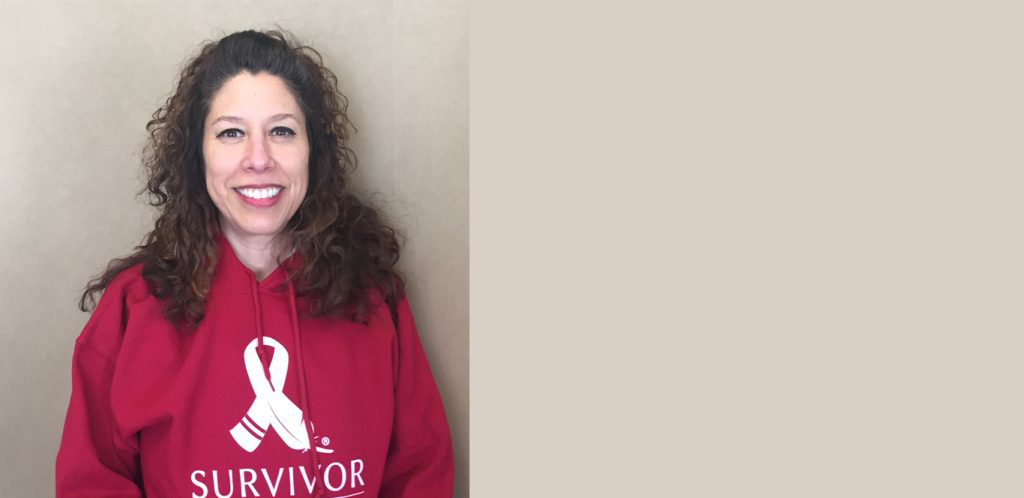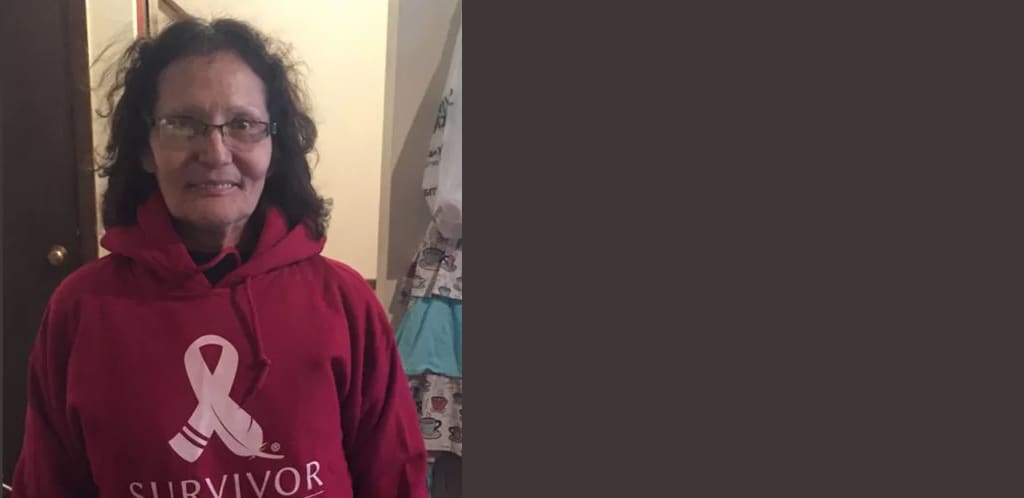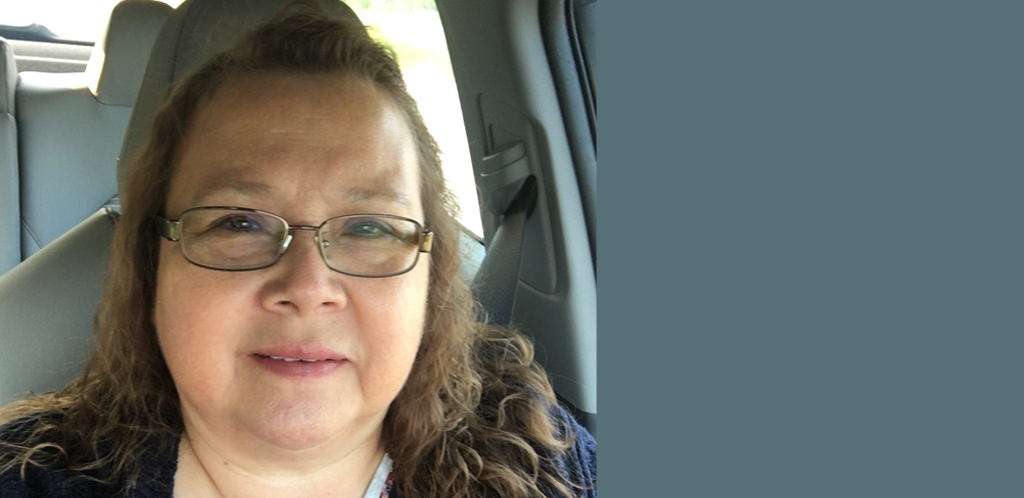
Cervical Cancer Stories

Kris Rhodes
“Had I not had a Pap test, [the cancer] would have progressed.” The Former American Indian Cancer Foundation’s CEO Kris Rhodes, MPH (Bad River and Fond du Lac Chippewa), is speaking out about her cervical cancer experience for the first time in recognition of Cervical Cancer Awareness Month. “Early detection may have saved my life.”
At 22 years old, a routine Pap test came back abnormal. When Kris went back to her tribal clinic for follow-up care, they found stage 0 carcinoma in situ. Kris and her doctors were quick to seek out treatment options, opting for cryotherapy (freezing the affected cells) and when that didn’t work, a LEEP (Loop Electrosurgical Excision Procedure) day surgery, which removed the pre-cancerous sections of her cervix. Kris continued to return to the doctor every 3-6 months for routine Pap tests to ensure that her test results were normal and that the cancer was treated successfully. Today, she has a history of regular Pap test results.
Kris is speaking out about her survivor experience for the first time in celebration of Cervical Cancer Awareness Month. Because of her early-stage diagnosis, she hasn’t identified with the term “survivor.” While stage 0 is classified as pre-cancerous, stage 0 is still a common form of cervical cancer that can be just as much of a shock as later stage diagnoses. At AICAF, we recognize and celebrate survivors across all stages of diagnosis.
Another reason that Kris has not openly spoken about her experience is because of the stigma surrounding HPV and cervical cancer. At the time, Kris didn’t share her diagnosis with her family and confided only in her partner, who drove her to her procedures and offered her strong support. “I didn’t tell my family and took care of it quietly. There is a shame associated with HPV and cervical cancer that is still prevalent in our communities.” In reality, most people come into contact with HPV during their lifetime. It’s time to end the stigma and amplify the conversation on cervical cancer screening.
“My message is that regular screening meant an early diagnosis for me. I had minimal treatment compared to someone with a more advanced cancer stage diagnosis.” Kris’s advice is to talk to your doctor about what screening is best for you, and what screening means. She also stresses the importance of the HPV vaccine, a tool that is now available to protect our future generations from cervical cancer. “Getting the vaccine for my children was a no-brainer.”
Thank you, Kris Rhodes for sharing your story. Please follow AICAF on Instagram @AmericanIndianCancer and on our website cervical-cancer-survivor-stories for more Cervical Cancer Awareness Month Survivor Stories.

Joni Buffalohead
Joni Buffalohead (Bdewakanton Dakota of the Sisseton-Wahpeton Oyate) has been getting regular Pap tests since she was a teenager. Following her second pregnancy at 30 years old, she received an abnormal Pap result. She returned to the doctor for follow-up care after giving birth to twin boys where she received the devastating news that she would need to have a full hysterectomy.
Joni shared with us a lot of the thoughts and feelings she had 20 years ago when she had her surgery.
Choosing to have her uterus removed was a difficult decision, especially since Joni and her husband had not yet decided if they were finished having children. Although the procedure would prevent future pregnancies, Joni elected to have the hysterectomy since she had already birthed a daughter and twin boys. Being unable to have children brought up a lot of difficult emotions for her. In the years since the procedure, Joni has found out that she may have had other options at the time.
Joni encourages other women to develop a strong relationship with their provider and have an active voice in their cervical cancer treatments. One regret that she has is that she did not educate herself more about cervical cancer treatments. Now that she has three adult children, she wishes that she would have had the opportunity to have more kids.
Joni’s diagnosis occurred during a time where not much was known about the links between HPV and cervical cancer. At first, Joni questioned who had first contracted HPV and spread it to whom. Questions of infidelity crept into her mind until she learned that HPV is extremely common in men and women and that HPV incidence might have occurred years prior to her marriage. In fact, 80-90% of people come into contact with HPV at some point in their life. Instead of unfairly blaming her husband, she made steps to protect their future generations from HPV-related cancers. She had honest conversations with her children about the importance of caring for your body: “I’ve been open with my children since early on. I taught my daughter to go to the OB-GYN regularly and my sons and daughter made the choice to get the HPV vaccine themselves.”
At the start of her cervical cancer journey, Joni made a promise to herself: “if I survive this, I will lead a more courageous life.” Today, she sings lead in a Native blues band Bluedog. Bluedog’s music gives voice to the struggles of Native people and celebrates the resilience of our people. With the knowledge that Native women experience higher rates of cervical cancer than white women, Joni now uses her voice to advocate for cervical cancer education and regular screening. She urges other women to get screened regularly and to use your voice for those who have gone through a cervical cancer journey: “if you go through it, please be an advocate. With your support, another woman might not have to.”
Thank you, Joni Buffalohead for sharing your story. Please follow AICAF on Instagram @AmericanIndianCancer and on our website for more Cervical Cancer Awareness Month Survivor Stories.

Lugene Flores
Lugene Flores (Oglala Lakota) is a fierce advocate for Pap tests after ignoring results had a huge impact on her life. After the birth of her son at 24 years old, she received an abnormal Pap test result at a routine care appointment. Instead of following up with her doctor, she switched from clinic to clinic for ten years, scared of what the abnormal result might mean. She didn’t face it until frequent heavy, painful periods started in her mid-30s.
With steady encouragement and support from her husband, Lugene made the decision to address the decade long history of abnormal Pap results. She went to the doctor for a biopsy and found stage 2 cervical cancer in her uterus. Lugene initially went in for surgery to remove her cervix and uterus, but they found that cancer had rapidly spread. They needed to remove her ovaries and fallopian tubes as well. Today, Lugene is healthy and works as a patient advocate, educating young Native women on the importance of Pap tests.
“I was just too scared,” Lugene recalls, “I never thought there was a possibility that I could have cancer. I thought maybe it could have been an STD and I was too embarrassed to find out if that’s why it was abnormal.”
Lugene is sharing her story with the American Indian Cancer Foundation to reach other women out there who have had abnormal Pap results and are afraid. She says that for women who are scared, it’s important to talk about the possibilities with their healthcare provider. Otherwise, circumstances can get worse. She cautions: “Just because you ignore an abnormal test result, it doesn’t mean it’s not there. I ignored it for 11 years and it was still there – getting worse. It’s best to catch it early. The earlier you catch any disease, the better you are to fight it.”
Lugene feels she wouldn’t have been afraid to follow up on her abnormal result if she had had the right education beforehand. She advocates for stronger cervical cancer screening education for women. “It’s important for these young ladies to know how essential Pap tests are. It can save their lives. If they get an abnormal result, they need to have the education in place, in advance.”
For women to be more knowledgeable about their Pap test experience, she advises, “They need to connect with their healthcare provider and ask what’s next, what does that mean, and what is that test? You will find out that the test result is really nothing scary by asking about it. Ask your doctor, ‘How long does it take me to get the results of this test? What does abnormal mean? What are some reasonings that paps come back abnormal?’” Lugene encourages women to be their own advocate if the doctor is not being proactive or supportive enough.
Lugene has seen how the cancer burden has affected American Indians and urges men and women of all ages to prioritize screening. “In our Native communities, cancer runs pretty high. I watched a good friend’s mother die from cancer. I watched her waste away and I don’t want to see people die like that. I hope our people start listening and stop being scared of the unknown. We have to remember that we have to be here for our younger generations.”
Thank you, Lugene Flores for sharing your story. Please follow AICAF on Instagram @AmericanIndianCancer and on our website for more Cervical Cancer Awareness Month Survivor Stories.

Mary Ann Cook
“I can do this,” Mary Ann Cook (Red Lake Ojibwe) reminded herself each day after finding out she had cervical cancer. A young mother and newly registered nurse, Mary Ann was just 26 when abnormal bleeding turned a fun family getaway into an anxiety-inducing stay in the emergency room. And while she admits the diagnosis shook her to her core, Mary Ann knew keeping a positive mindset would give her the strength to beat it. “I’m not going to die from this,” she declared. In 1990, Mary Ann was vacationing with her family in the Black Hills when she noticed…
“I can do this,” Mary Ann Cook (Red Lake Ojibwe) reminded herself each day after finding out she had cervical cancer. A young mother and newly registered nurse, Mary Ann was just 26 when abnormal bleeding turned a fun family getaway into an anxiety-inducing stay in the emergency room. And while she admits the diagnosis shook her to her core, Mary Ann knew keeping a positive mindset would give her the strength to beat it.
“I’m not going to die from this,” she declared.
In 1990, Mary Ann was vacationing with her family in the Black Hills when she noticed some spotting. At the time she thought it was from her recent colposcopy, a follow up procedure to an abnormal Pap test. On their way home from the Black Hills, Mary Ann and her family decided to camp at a powwow, and in the middle of the night the bleeding got heavier. This time it “was not normal,” so she decided to visit a nearby emergency room. There the doctors concluded she was simply experiencing a heavy cycle and prescribed her birth control pills. The spotting subsided, but Mary Ann continued to feel drained and dizzy. Back on the road, they stopped at a gas station when Mary Ann realized the bleeding was now worse than ever. Again they rushed to the closest hospital, where doctors discovered Mary Ann’s hemoglobin was shockingly low; her IUD had also fallen out from excessive bleeding. After a D&C and emergency surgery, physicians told Mary Ann they had removed a golf ball-sized tumor from her cervix. A biopsy confirmed it was invasive cervical squamous cell cancer shortly after.
As a nurse, Mary Ann understood this disease often came without noticeable signs or symptoms in the early stages, but never imagined it could progress as quickly as hers did. If she had known her abnormal Pap could be indicative of something so serious, Mary Ann said she would have been more aggressive and proactive about her health. “Maybe I wouldn’t have taken it so lightly,” she said. And while an abnormal Pap test is not a cancer diagnosis, it’s important that Native women follow up with their doctors to discuss the results – especially since they are nearly twice as likely to develop cervical cancer compared to white women.
An extensive full body scan showed that the cancer hadn’t spread to Mary Ann’s major organs. News like this lifted her spirits, reminding her to take every day as it came, and to celebrate those “little milestones” on the way to recovery.
“Things are going to be okay”, she continued, “I am going to be okay.”
A few weeks after the diagnosis, doctors made arrangements for Mary Ann to have a radical hysterectomy, an extensive surgery that required removal of her uterus, cervix and lymph nodes. They tested her lymph nodes as well, but found no traces of cancer. If just one had tested positive, doctors said chemotherapy would’ve been a must. Because of the procedure’s complexity, it couldn’t be performed in Mary Ann’s hometown medical center – the closest to offer it was four hours away at the University of Minnesota (UMN). Fortunately, she had family living in the Twin Cities and was able to stay with them whenever she needed.
Mary Ann remained in the hospital for about a week following surgery, using a catheter to reduce urinary problems. “It was really painful,” she explained. Her care team provided a series of pain medications to relieve the discomfort, but it took some trial and error before doctors found a remedy that didn’t produce negative side effects. The first medicine she tried dropped her oxygen levels so low one of her lungs collapsed, the next caused her to wake in the middle of the night “with vivid nightmares.” Eventually the team figured out a combination of Tylenol and codeine worked best.
“I was looking a mess,” Mary Ann described herself upon returning home from the hospital. She left with the catheter and used it for an entire month before it was removed. At first, Mary Ann was required to have a follow up exam every six months at UMN’s medical center; after a while she went annually. Now cancer free, she visits the doctors in her community for regular screenings and is given a Pap test every two years – national guidelines recommend women aged 21-65 get screened every three years. Mary Ann credits early detection for saving her life. If she hadn’t been persistent about getting regular Pap tests, “who knows how far the cancer would have spread.”
The diagnosis came as a shock to family and friends, but they were never hesitant about stepping in to support Mary Ann on her journey. Her parents were by her side immediately when she had emergency surgery. And when she was home from the hospital they’d visit just to cook for her family and clean the house. Mary Ann is also grateful for her husband, not only for the care he provided during surgery and the months that followed, but for supporting her healing journey for more than 30 years.
“We made it,” she said.
Today Mary Ann helps raise awareness about cervical cancer through community events and cancer walks. As the Director of Nursing at Red Lake Hospital, she enjoys connecting with patients and using her experience to stress the importance of screening. “It really bothers” her that she’s known many women who have died from cervical cancer simply because they waited years to have an exam. On a mission to change the narrative of this preventable disease, Mary Ann encourages Native women to be vigilant about their health “at any cost.”
“Follow through if anything is abnormal,” she said. “And don’t take it lightly because anything can happen.”
Thank you Mary Ann for sharing your story.

Support Our Cancer Warriors
A gift to the American Indian Cancer Foundation helps us strengthen our programs, build larger campaigns, and provide more resources to families across Indian Country. While grants and contracts fund specific projects, it’s generous donors like you that play a vital role in making this work happen!
